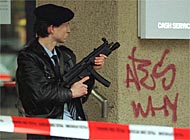Getting the guns out of the home

A series of high profile gun crimes in Switzerland has reinforced calls for a change to a long military tradition: that of reservists keeping their weapons at home.
Earlier this week, a right-wing extremist fired a hail of bullets at a building in Berne housing squatters from the city’s alternative scene. In March, a young gunman holed up in an apartment block in the southeastern city of Chur fired on passers-by from his balcony before being killed by a police marksman.
Such incidents are no longer as rare as they used to be.
The founding fathers of the Swiss Confederation in the 19th century decided, when creating the army, not to opt for a standing, professional force, but a militia. These hybrid civilian-soldiers, who kept their guns and equipment at home, could be battle-ready within a few hours.
A simple, yet effective formula, for the days when the workplace and the home were often one and the same – which was the case until the Second World War. Nowadays, the practice of army troops keeping modern assault rifles in the back of the wardrobe is increasingly questioned.
Professor Martin Killias, a criminologist from Lausanne University, who sat on a government panel in 1990 looking at army reform, called for the guns to go back to the armouries.
His appeal fell on deaf ears, but since then there has been one major reform of the military – Army 95, and a second one – Army 21 – is in the pipeline. Killias thinks the time is right to relaunch a campaign to cut the number of guns kept at home, targeting what he sees as the inefficiency of the system.
“The modern soldier needs much more equipment than just a gun and a uniform,” he said, “and so in an emergency today it wouldn’t just be a question of getting the unit together. After mobilisation, they would still have to go to the local arsenal, and pick up all the extra equipment which they can’t store at home.”
“On top of this, more and more people, particularly students, live nowhere near the place where their weapons are stored, or commute to other regions for work, so they don’t have quick access to their arms and equipment”.
Killias believes that the system is an anachronism, which has no place in a modern army. “It’s totally irrational, no army should be a museum piece.” he says.
Like all Swiss men, Killias has years of militia service behind him. He disliked keeping his equipment at home between the call-up periods, seeing it as an intrusion on his civilian life.
From a criminologist’s perspective he says that with 500,000 assault rifles in Swiss homes, it comes as no surprise that gun crime occurs: “We shouldn’t be shocked if some people get wild, get out of control, and start shooting”.
Despite Switzerland’s relatively low crime rate compared to other western societies, Killias says the statistics show that guns play a significant role in what crime there is. “It’s not true that Switzerland is the most peaceful place in the world,” he says, “since we rank high in terms of domestic killings.”
He says women in violent relationships are put in extremely dangerous situations because of the accessibility of weapons. While there are few hard statistics, anecdotal evidence suggests that guns are used as a threat, even if the abusive husband has no intention of firing them.
Another major problem is the high suicide rate in Switzerland, with guns providing an easy solution for those in desperate situations.
Killias says he is not anti-gun as such, but thinks they shouldn’t be spread throughout society. “I think it would be a good move if we could simply leave the guns to target shooters and hunters, and other people who have a legitimate interest in keeping a gun at home.”
With army reform in the air, Killias thinks it’s the right time to push for change. “When I was on the panel in 1990 very few people in the government supported the kind of reforms I suggested, such as reducing the number of soldiers. Now these reforms are on the official agenda, so I think people are ready for other changes.”
Getting the military establishment on side is essential. But Killias thinks support for change is growing within the army.
“The army is a hostage to right wingers who always fight any changes to tradition. I think the military reformers wouldn’t be sorry to break free of them, but on the other hand I’m not sure they would have the courage to take the initiative,” he says.
by Jonathan Fowler

In compliance with the JTI standards
More: SWI swissinfo.ch certified by the Journalism Trust Initiative
You can find an overview of ongoing debates with our journalists here. Please join us!
If you want to start a conversation about a topic raised in this article or want to report factual errors, email us at english@swissinfo.ch.